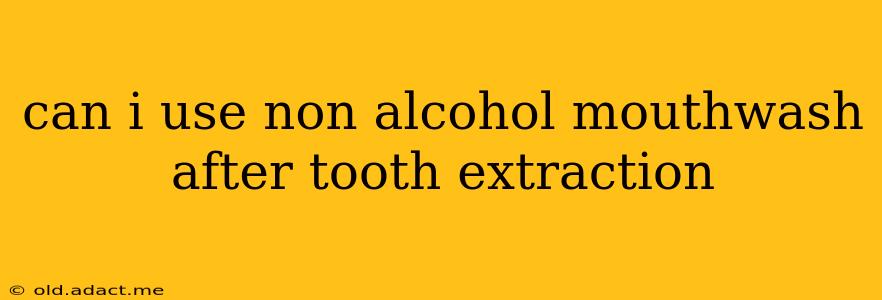Can I Use Non-Alcohol Mouthwash After Tooth Extraction?
Following a tooth extraction, maintaining optimal oral hygiene is crucial for preventing infection and promoting healing. Many people wonder about the role of mouthwash, particularly non-alcohol varieties, in this process. The short answer is: generally yes, but with precautions.
While non-alcohol mouthwash can be helpful, it's essential to use it correctly and choose the right type. Let's delve into the details.
What Type of Mouthwash is Best After a Tooth Extraction?
After a tooth extraction, your dentist or oral surgeon will likely recommend a gentle, alcohol-free mouthwash. Alcohol-based mouthwashes can irritate the extraction site, delaying healing and potentially causing discomfort. Look for mouthwashes that contain:
- Chlorhexidine gluconate: This is a powerful antiseptic that helps kill bacteria and prevent infection. It's often recommended by dentists for post-extraction care.
- Cetylpyridinium chloride (CPC): Another effective antiseptic that can help reduce bacteria in the mouth.
Avoid mouthwashes containing strong astringents or those designed for whitening teeth, as these can irritate the sensitive extraction site. Always check the label to ensure the mouthwash is alcohol-free.
How to Use Mouthwash After Tooth Extraction?
Even with a non-alcohol mouthwash, proper usage is critical. Improper rinsing can dislodge the blood clot that forms in the extraction socket, leading to a painful condition called dry socket. Here's how to use mouthwash safely and effectively:
- Wait for the initial blood clotting: Avoid rinsing your mouth vigorously for at least the first 24 hours after the extraction. Gentle rinsing with saline solution (salt water) is usually sufficient during this time.
- Gentle rinsing: Once your dentist gives the okay, gently swish the non-alcohol mouthwash around your mouth, avoiding the extraction site as much as possible. Don't spit forcefully; let the mouthwash drip out of your mouth.
- Frequency: Follow your dentist's instructions regarding frequency. Generally, rinsing 1-2 times a day is sufficient. Over-rinsing can be detrimental.
- Don't Gargle: Avoid gargling, as this creates suction that can dislodge the blood clot.
What About Salt Water Rinses?
Salt water rinses are often recommended in the initial stages after an extraction. They are a gentle way to clean the mouth, reduce inflammation, and help remove food debris without disturbing the blood clot. Dissolve ½ to ¾ teaspoon of salt in a glass of warm water and rinse gently several times a day, especially after meals.
When Should I Call My Dentist?
While using non-alcohol mouthwash is usually safe, it's crucial to contact your dentist or oral surgeon immediately if you experience:
- Severe pain: Pain that doesn't improve with over-the-counter pain relievers.
- Increased swelling: Significant swelling beyond what's expected after the procedure.
- Excessive bleeding: Bleeding that doesn't stop after applying pressure for 30 minutes.
- Signs of infection: Fever, chills, or pus around the extraction site.
- Dry socket: Severe pain several days after the extraction, often accompanied by a visible empty socket.
Can I Use Any Non-Alcohol Mouthwash?
Not all non-alcohol mouthwashes are created equal. Some may still contain ingredients that can irritate the sensitive area. It's best to consult your dentist for a recommendation or choose a mouthwash specifically formulated for post-operative oral care.
Conclusion
Non-alcohol mouthwash can be a helpful addition to your post-extraction oral hygiene routine, but it's essential to follow your dentist's instructions carefully. Choose a gentle, alcohol-free mouthwash, avoid aggressive rinsing, and contact your dentist immediately if you experience any complications. Remember that proper oral hygiene and careful attention to the healing process are crucial for a successful recovery.
